A Bosnian court has issued an international arrest warrant for Milorad Dodik, the leader of the Serb Republic, following his defiance of constitutional orders and a recent jail sentence. This unprecedented action has escalated tensions in the already fragile political landscape of Bosnia and Herzegovina.
Key Takeaways
- An international arrest warrant has been issued for Milorad Dodik, the leader of the Serb Republic.
- Dodik is accused of undermining Bosnia’s constitutional order and has defied previous court rulings.
- The situation raises concerns about potential ethnic tensions reminiscent of the 1990s conflict.
Background on Milorad Dodik
Milorad Dodik, 66, has been a prominent figure in Bosnian politics for nearly three decades. Initially seen as a moderate leader, he has shifted towards a more nationalist and pro-Russian stance in recent years. His actions have included:
- Defiance of International Authority: Dodik was sentenced to one year in prison for ignoring the orders of an international peace envoy, Christian Schmidt.
- Legislative Actions: He attempted to bar state police and judiciary from operating in the Serb Republic, a move that was later suspended by Bosnia’s constitutional court.
- Calls for Secession: Dodik has repeatedly threatened to secede the Serb Republic from Bosnia, raising alarms about the stability of the region.
The Arrest Warrant
The international arrest warrant was issued after Dodik traveled abroad, defying a domestic arrest warrant. Key points include:
- Travel to Serbia and Israel: Dodik crossed into Serbia and then attended an antisemitism conference in Israel, ignoring the legal proceedings against him.
- Political Reactions: Dodik has dismissed the warrant as a politically motivated attack on his leadership, claiming it is an abuse of the justice system.
- International Implications: The warrant has been forwarded to Interpol, indicating the seriousness of the situation and the potential for international involvement.
Rising Tensions in Bosnia
The issuance of the arrest warrant has heightened fears of renewed ethnic tensions in Bosnia, which has a history of conflict stemming from the breakup of Yugoslavia in the 1990s. The current political climate is characterized by:
- Increased Military Presence: The European Union has bolstered its peacekeeping force in Bosnia, reflecting concerns over potential violence.
- Divided Political Landscape: Bosnia remains split into two entities: the Serb Republic and the Federation of Bosnia and Herzegovina, each with its own government and parliament.
- Public Sentiment: While Dodik has historically enjoyed support among Serbs, there are signs that his popularity may be waning as ordinary citizens grow weary of his divisive rhetoric.
Conclusion
The international arrest warrant for Milorad Dodik marks a significant escalation in Bosnia’s ongoing political crisis. As tensions rise, the potential for conflict looms, prompting calls for dialogue and reconciliation to prevent a return to the violence of the past. The situation remains fluid, with the international community closely monitoring developments in the region.
Sources
- Bosnian Serb leader Dodik: from Western darling to pro-Russian separatist, Reuters.
- Bosnia issues international arrest warrant for Milorad Dodik – DW – 03/27/2025, DW.
- Bosnia issues international arrest warrant for Serb leader Dodik, France 24.
- Bosnia issues international arrest warrant for Serb leader Dodik | National, The Rogersville Review.
- International arrest warrant for Serb leader Dodik by Bosnia court, The Jerusalem Post.






